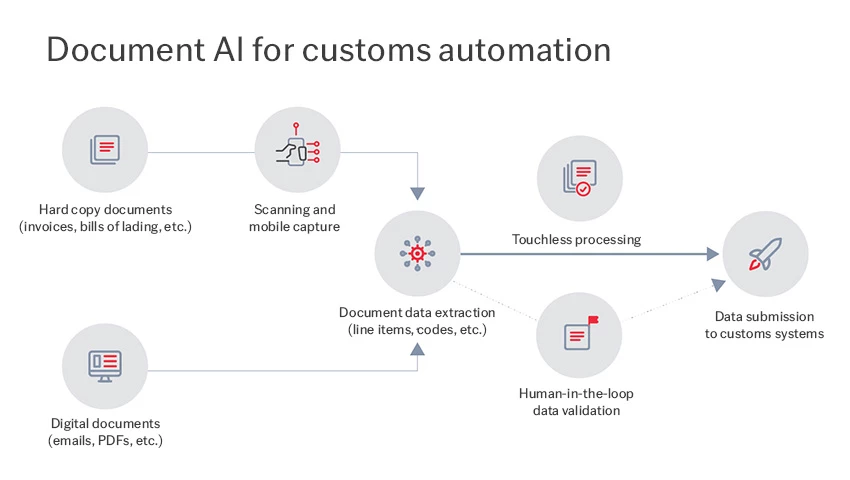AI in Action: Fast-Tracked Customs Clearance
by Slavena Hristova, Director of Product Marketing
New regulations impose a huge bureaucracy burden on businesses to ensure they maintain compliance. For transportation and logistics providers, it’s often further complicated by introducing change into processes that are already plagued with slow, error-prone, manual steps, particularly involving documents. In this way, regulatory change can create a new level of friction and unpredictability. We saw this not long ago when Brexit added a new layer of bureaucracy to trade between the United Kingdom and the European Union. Companies suddenly found themselves bogged down by customs declarations and manual data entry—and the resulting mounting costs.
To remain agile in today’s ever-evolving regulatory landscape, transportation and logistics providers must ensure that documents aren’t holding them back. With the availability of intelligent, AI-driven solutions on the market today for accurately moving data from documents into business processes, transportation and logistics providers are finding new ways to get a competitive edge. Case in point: customs clearance.

The customs clearance challenge
Customs clearance has long been a labor-intensive process in transportation and logistics. When employees have to painstakingly enter details line by line, a single declaration can take hours or even days to process, while minor typos or missing data can bring shipments to a standstill or impose fines. In fact, many businesses still pay a premium for third-party brokers just to navigate the complexity.
For some, these inefficiencies are just the cost of doing business. But for companies shipping perishable goods or operating on tight margins, every delay, every mistake, and every extra fee cuts into profits.
Businesses need speed and accuracy that make even the most complex processes, like customs clearance, predictable. That’s where Document AI comes in.
The solution: Document AI and automation
CustomsTrack, a UK-based startup, saw an opportunity to change the status quo in customs clearance. Rather than relying on manual data entry and third-party brokers, they partnered with ABBYY to integrate AI-powered document processing into their customs automation platform. This took the guesswork out of customs declarations.
Here’s how the solution works: AI is used to scan commercial invoices and packing lists, extracting key details even from smudged documents or handwritten notes. It validates every field, including commodity codes, weights, costs, and VAT numbers, for accuracy. Then the data gets submitted directly to national customs systems like the Customs Declaration Service (CDS) in the United Kingdom or its equivalent in other countries.

One of CustomsTrack’s early adopters—a UK food importer called Portumna Pastry, moving frozen pastries and meat from Ireland—put the system to the test. The importer’s challenges were significant. Their IT systems were centralized in the UK with no in-house customs processing. Every shipment required manual data entry, and every border crossing involved third-party brokers and extra costs.
That changed nearly overnight. With AI, the entire process became fully automated. ABBYY’s system extracted key details from invoices, and CustomsTrack processed and submitted customs declarations before the truck even left the facility.
Customs clearance was consistently completed in less than five minutes, dramatically reducing border delays and keeping food fresh. With no need for brokers, extra costs disappeared. With 100% accuracy for extracted data, shipments moved smoothly without fines or setbacks.
A once slow, uncertain process became fast and reliable.
AI’s impact on global trade
Food products with short shelf lives obviously benefit from AI-powered customs clearance, but the truth is, any company shipping goods can, too. CustomsTrack’s system follows World Customs Organization data models, making it easy to scale across industries and international markets.
And more companies are switching over to this efficient model. A major manufacturer importing thousands of farm machinery parts into the UK every month has adopted the technology, for example. The same AI-powered system is now helping other sectors cut through border delays.
This solution keeps delays to a minimum and errors rare. With 99% straight-through processing, customs declarations are cleared in minutes, not hours—without human intervention.
Customs without the chaos
For years, businesses have accepted customs clearance as a necessary headache—a slow, expensive, and unpredictable part of doing business. But that’s changing.
With ABBYY’s intelligent document processing and CustomsTrack’s automated customs submission, companies are slashing processing costs by up to 80% and seeing 99% of declarations processed automatically. AI-driven systems also work around the clock, so shipments keep moving even while employees are off the clock.
What was once considered an unavoidable burden in international trade can now be part of a streamlined, predictable process firmly within businesses’ control. That’s why more companies are turning to intelligent automation. They’re not chasing technology trends, nor are they looking to reinvent the wheel or overhaul entire business models. They’re simply choosing to make their existing processes a lot more efficient, reliable, and compliant.
